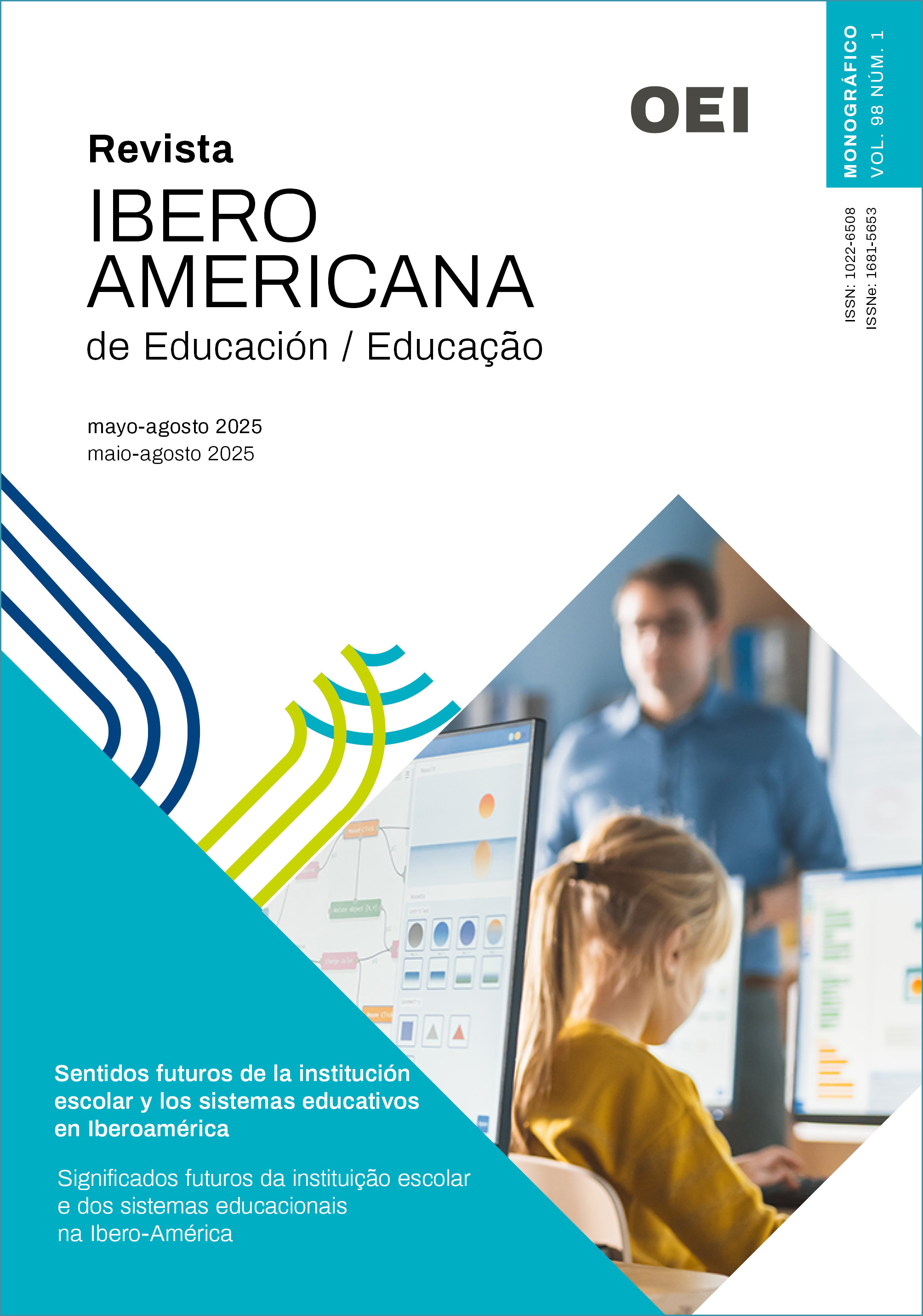A future without futures. High school students' predictions for the end of school
DOI:
https://doi.org/10.35362/rie9816645Keywords:
school, everyday life, deschooling, inequalityAbstract
This paper is a qualitative analysis of the meanings constructed by a group of students from a high school in the municipality of Chimalhuacán, State of Mexico, regarding the end of school. The exercise allows us to understand the aspects of the present that educational actors use to plot the future if school were to be abolished or replaced by the techno-educational market, a possible scenario in a time of technological accelerationism. The text includes four of the discussions that specialists have generated about school, namely: the idea of progress, social inequality, techno-education, and school culture. The methodology used was ethnography, and the analysis of 30 microtexts written by the study participants. Among the findings, four meanings were identified that frame the students’ concerns, which were conceptualized as: a. A future without futures, b. End of employment, c. Alienation or return to social time, and d. Transhumanism. In conclusion, the school is understood as a strategic institution for social order, which is why its defense is advocated, although the problems inherent to it are not denied.
Downloads
References
Bauman, Z. (2007). Los retos de la educación en la modernidad líquida. Barcelona: Gedisa S.A.
Bertely, M. (2000). Conociendo nuestras escuelas. Un acercamiento etnográfico a la cultura escolar. México: Paidos.
Braidotti, R. (2015). Lo posthumano. Barcelona: Gedisa .
Certeau, M. (2000). La invención de lo cotidiano. Artes de hacer . México: Universidad Iberoamericana .
Díaz, Á., e Inclán, C. (2001). El docente en las reformas educativas. Sujeto o ejecutor de proyectos ajenos. Revista Iberoamericana de Educación(5), 17-41. https://n9.cl/wkf2w
Dubet, F. (2011). Repensar la justicia social. Contra el mito de la igualdad de oportunidades . Buenos Aires : Siglo XXI.
Durkheim, E. (1982). Historia de la educación y de las doctrinas pedagógicas en Francia. Madrid: La Piqueta.
Dussel, I. (2022). ¿Estamos ante el fin de la escuela? Transformaciones tecnológicas y pedagógicas en la pospandemia. Revista del IICE, 51, 31-48. https://n9.cl/a8d8t
Dussel, I., y Caruso, M. (1999). La invención del aula. Una genealogía de las formas de enseñar. Buenos Aires: Santillana .
Furlan, A. (1996). Currículum e institución. México: IMCED.
Geertz, C. (2003). Descripción densa: hacia una teoría interpretativa de la cultura. En C. Geertz, La interpretación de las culturas (19-40). Barcelona: Gedisa.
Han, B. (2012). La sociedad del cansancio. Barcelona: Herder.
Hui, Y. (2020). Fragmentar el futuro. Ensayos sobre tecnodiversidad. Barcelona : Caja Negra Editores.
Illich, I. (1971). La sociedad desescolarizada. Cuernavaca : Biblioteca anarquista Anti-Copyright .
Klichowski, M. (2015). Transhumanism and the idea of education in the world of cyborg. En H. Krauze-Sikorska, M. Klichowski, y A. Mickleickz, The educational and Social World of a Child. discourses of Communication, Subjectivity and Ciborgization. (431-438). Ponzan: University Press Ponzan.
Moreno-Sánchez, E., y Espejel-Mena , J. (2013). Chimalhuacán en el contexto local, suburbano y regional. Quivera. Revista de estudios territoriales, 15(1), 77-99. https://n9.cl/tukco
Narodowski, M. (2022). Futuros sin escuelas: Tecnocapitalismo, impotencia reflexiva y Pansophia secuestrada. Buenos Aires: Perspectivas .
Plá, S., Muñoz-Becerra, N., y Eugenio-Pérez, A. (2024). El futuro de la escuela desde la perspectiva de los jóvenes de América Latina. Educ. Soc. Campinas, 45, 1-20. https://n9.cl/t1lt6
Rivas, A. (2019). ¿Quién controla el futuro de la educación? Buenos Aires: Siglo XXI.
Rockwell, E. (2005). La escuela cotidiana. México: Fondo de Cultura Económica.
Rockwell, E. (2018). Temporalidad y cotidianeidad en las culturas escolares. Cuadernos de Antropología social, 47, 21-32. https://n9.cl/1mx95u
Ryuichi, I. (2017). ¿Deberíamos mejorar la naturaleza humana? Una interrogante planteada desde una perspectiva asiática. En N. Bostrom, y J. Savulescu (Eds.), Mejoramiento humano (63-74). Madrid: TEELL.
Sandoval, E. (2000). La trama de la escuela secundaria: institución, relaciones y saberes. México: UPN-Plaza Valdés Editores.
Simons, M., y Masschelein, J. (2014). Defensa de la escuela. Una cuestión pública . Miño y Dávila .
Tosoni, C. (2021). Reformas educativas y reconfiguaraciín de la subjetividad docente en Argentina. Pedagogía y saberes(55), 105-120. https://n9.cl/l6tom
Viñao, A. (2007). Culturas escolares y reformas (sobre la naturaleza histórica de los sistemas e instituciones educativas). Revista Teias, 1(2), 1-25. Río de Janeiro. https://n9.cl/oqxfn
Walsh, C. (2013). Pedagogías decoloniales. Prácticas insurgentes de resistir, (re)existir y (re)vivir. Quito: Abya Yala.
How to Cite
Published
Issue
Section
License
Copyright (c) 2025 Iberoamerican Journal of Education

This work is licensed under a Creative Commons Attribution 4.0 International License.
Any authors who publish with this journal accept the following terms:















